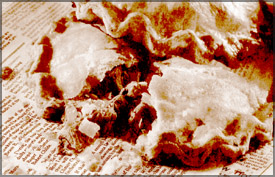|
observer |
|
|
|
|
|
OTHER LINKS |

|

|

|
|
Ownership of the Cornish pastyFor years, it has been one of Cornwall's
(UK) most famous and lucrative (producing money) exports. But a dispute
about the origins of the pasty (small pie of meat and crust baked
without a dish) has sparked a culinary (to do with cooking) feud, with
historians from neighbouring Devon claiming the discovery of a
16th-century Todd Gray, Chairman of the Friends of Devon's Archives, who found the recipe between the pages of a 16th-century audit book, said: "It has been a great joy for me, as a local historian, to have discovered that pasties may have originated in Devon and spread to Cornwall later. "I contracted Cornwall's record office and they confirmed that the earliest record of a Cornish pasty recipe was written in 1746 - two whole centuries after the one I have uncovered." But the Cornish have their own account of the pasty's origin. Les Merton, author of the Official Encyclopedia of the Cornish Pasty, said that even though Devon may have the earliest written record, pasty recipes had been handed down in Cornwall since 8,000 BC by word of mouth. "There will always be debates about the origins of the pasty," he said. "One theory in parts of Cornwall is that it went back to the beginning of time - well, almost." Devonians were standing by their claim. Poet and ferryman Kevin Pyne, from Dartmouth, said: "I admire the Cornish for their gallant (brave) efforts in defending what is now factually a hopeless position." Angie Coombs, from the Cornish Pasty Association, believes the battle of pasty ownership is likely to rumble on for years. The pasty industry is worth 60 million sterling pounds a year to the Cornish economy and three million are produced each week, with 90 per cent of them sold outside the country. It had been thought that pasties were created as a way of protecting Cornish tin miners from ingesting (taking in) poisonous arsenic found in the shafts. They would eat the pasty-wrapped beef, onion and turnip filling while holding on to the crimped (pressed into ridges) crust, which got covered in dirt and grime from their hands and could be discarded. |

 recipe which proves it first appeared in their county.
recipe which proves it first appeared in their county. 






